The Dynamics of Modern Diplomacy: Challenges and Opportunities in a Globalized World
Explore the complexities of modern diplomacy in a globalized world. Learn about key challenges, opportunities, and how diplomacy shapes international relations today.

Introduction:
Modern diplomacy is changing drastically. It increasingly involves international firms, NGOs, internet giants, and even individual activists, not just government personnel. With globalization of communication, commerce, and technology, the globe is more linked than ever, yet complexity increases. Diplomats now face an uncertain but promising terrain.
This blog will discuss contemporary diplomacy's difficulties, prospects, and why it's vital to global security and collaboration.
The Key Challenges Facing Modern Diplomacy
1. Shifting Power Dynamics
The global power structure is more complex than in the 20th century. As China, India, and Russia rise to prominence, the US is no longer the only superpower. The European Union and BRICS (Brazil, Russia, India, China, South Africa) complicate matters.
Diplomats must balance national interests with multilateral collaboration in this divided power system. Finding common ground may be like threading a needle with countries' diverse interests.
2. Technological Disruption
Digital diplomacy—or "e-diplomacy"—has transformed everything. Twitter is used by governments to communicate with the world. Ukraine's President Volodymyr Zelenskyy used Twitter to mobilize worldwide support and enlighten the world during the Russian invasion.
However, digital change presents problems. Cyberattacks, false news, and information manipulation may hinder diplomacy. Diplomats must be tech-savvy to combat digital disinformation and promote openness and trust.
3. Global Crises and Climate Change
Modern diplomacy is being tested by COVID-19, geopolitical conflicts, and climate change. These global concerns demand collaborative action, which is difficult.
Climate discussions under the Paris Agreement have highlighted how difficult it is to balance the interests of developing nations. Developing countries' economic development demands frequently conflict with global carbon reduction aspirations.
4. Non-State Actors
Modern diplomacy goes beyond states. Corporate, multinational, and individual non-state players increasingly exert tremendous influence. Google and Facebook may affect international relations, whereas Greta Thunberg has changed climate change discourse.
This diversity of power hampers diplomacy since state-to-state negotiation generally ignores these new entities
Opportunities Emerging in Modern Diplomacy
1. Enhanced Global Cooperation
Globalization has increased collaboration to unprecedented levels despite its obstacles. Countries may discuss global concerns in multilateral organizations like the UN and WHO.
International collaboration on COVID-19 vaccine research and global trade agreements that guarantee products flow despite geopolitical conflicts are recent examples.
2. Technology as a Tool for Good
Tech may disrupt, but it also provides great diplomatic chances. AI-powered data analytics may help diplomats predict crises. Transparent digital platforms enable real-time nation-citizen communication.
Technology also streamlines international interactions. Online conferences and discussions save time and money while preserving diplomatic momentum.
3. Economic Interdependence
Global commerce has produced a web of economic interdependence, where one country's prosperity depends on others. Interconnectedness has made war less appealing as countries seek economic progress via stability.
Despite political tensions, the U.S.-China economic connection anchors their ties. Economic diplomacy is crucial to peacebuilding and conflict resolution.
4. Innovative Approaches to Conflict Resolution
Diplomacy no longer requires in-person discussions. Mediators are leveraging cultural exchange, people-to-people diplomacy, and public participation to reconcile antagonistic countries.
Track II diplomacy—unofficial engagement outside government channels—has helped peace efforts globally, including in the Middle East.
How Diplomacy Shapes Our World Today
Modern diplomacy affects everything from product pricing to environmental regulations. It ensures countries communicate successfully, reducing misunderstandings and war.
Diplomacy has helped reach worldwide accords on nuclear disarmament, global health, and trade laws. Cultural understanding helps countries learn from one other and strive toward common objectives.
What Lies Ahead for Diplomacy?
Diplomacy may rely on its capacity to adapt to fast change. Artificial intelligence, climate change, and geopolitics will change international relations. Diplomats must innovate while upholding discourse, negotiation, and collaboration to thrive.
Including NGOs, companies, and civil society in diplomacy may help address challenges no one country can. In the future years, mankind will have to overcome its divisions to tackle global issues.
FAQs About Modern Diplomacy
1. What is the biggest challenge facing modern diplomacy?
Emerging multipolar power dynamics and non-state actors complicate consensus-building, making it the toughest problem.
2. How has technology impacted diplomacy?
Technology has complicated and improved diplomacy. It has enhanced communication and openness but also caused disinformation and cybersecurity dangers.
3. Why is modern diplomacy important?
Modern diplomacy is necessary for peace, collaboration, and solving global issues like climate change and pandemics.
4.Diplomacy in today's linked: world goes beyond handshakes and closed-door conversations. From climate change to technological advances, contemporary diplomacy faces new difficulties and offers revolutionary potential.

 Najmul Hasan
Najmul Hasan 





